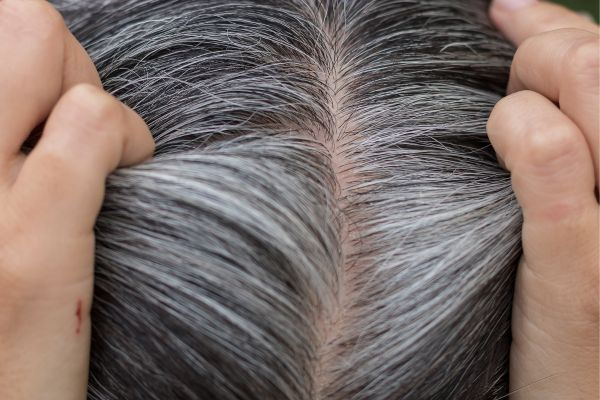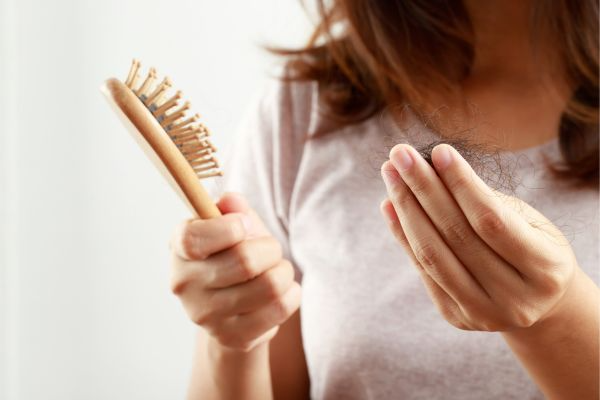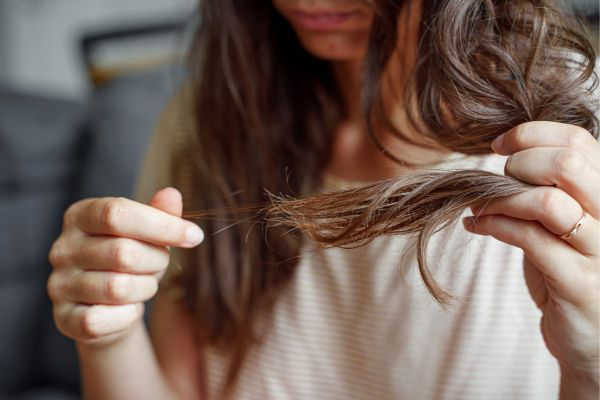The Relationship Between Stress and Grey Hair
May 11, 2023 | By Queenie

The Relationship Between Stress and Grey Hair: Understanding the Science and Prevention Strategies
As we age, many of us notice grey hairs sprouting up. But for some people, greying happens earlier than expected. One potential culprit? Stress. While we've long known that stress can adversely affect our bodies, recent research has shed light on how chronic and acute stress can cause our hair to turn grey prematurely.
In this article, we'll explore the science behind stress-related grey hair, its effects on the body, and prevention strategies for those looking to keep their locks youthful.
The Science Behind Stress-Related Grey Hair

According to recent research in behavioral medicine, chronic stress can contribute to the premature greying of hair by damaging the hair pigmentation patterns in hair follicles. Melanin, which is produced by melanocyte cells in hair follicles, determines hair color.
As we age, melanin production in the hair follicle decreases, resulting in grey or white hair. However, studies have shown that stress can also cause a decrease in melanin production. The sympathetic nervous system, which is in charge of the body's fight-or-flight response, is crucial to this process.
Nerves in this system reach hair follicles, and stress releases the chemical norepinephrine into the strand. Norepinephrine damages the melanocyte stem cells living there, causing them to rapidly turn into pigment cells and move out of the hair follicles. Once these cells are lost, new pigments cannot regenerate, and the damage is permanent.
Dr. Ya-Chieh Hsu of Harvard University, the study's principal researcher, was surprised to see that stress had such a negative impact on the body's response. All of the melanocyte stem cells died within a few days, causing permanent damage. They don't regenerate pigments anymore.
Common Causes of Stress

Stress triggers can vary depending on individual circumstances and differ for different people. While it's a natural part of the aging process, it helps to understand where stress is coming from. Here are some common causes of stress in adults:
Work-Related Stress
Job pressures, long hours, heavy workload, lack of job security, difficult co-workers or bosses, and career changes can all contribute to work-related stress.
Financial Stress
Financial difficulties such as debt, inability to meet financial obligations, unexpected expenses, and financial insecurity can cause significant stress in adults.
Relationship Stress
Problems in romantic relationships, marital conflicts, issues with family members or friends, and caregiving responsibilities can all be sources of stress for adults.
Health-Related Stress
Managing chronic illnesses, dealing with acute health issues, caring for a sick loved one, and concerns about health and well-being can all cause stress.
Life Transitions
Major life changes such as moving, getting married, having a baby, divorce, retirement, or dealing with the death of a loved one can be significant stressors.
Academic stress
Adults pursuing higher education or professional certifications may experience stress related to exams, assignments, deadlines, and the pressure to perform well academically.
Parenting Stress
Raising children, dealing with parenting challenges, and balancing work and family responsibilities can be significant sources of stress for adults who are parents.
Daily Life Stress
Everyday stressors in the modern world such as commuting, managing household chores, dealing with traffic, and meeting daily responsibilities can accumulate and contribute to overall stress levels.
Social Stress
Social pressures, expectations, and conflicts in social relationships, such as friendships, social events, and social comparisons, can also cause stress.
Personal Stress
Issues related to self-identity, self-esteem, personal goals, and managing unique challenges can also be significant causes of stress in middle age and adults. This is also known as psychological stress.
It's important to note that everyone experiences stress differently, and what may be stressful for one person may not be stressful for another.
Recognizing and managing stress in healthy ways is essential to maintaining overall well-being. If you're experiencing chronic stress, seeking support from a qualified healthcare professional or mental health provider is recommended.
The Effects of Stress on the Hair

Stress can have many negative effects on the body, including hair loss and decrease of pigment producing cells. It could be a factor if you're experiencing more hair loss than usual. Stress and anxiety can trigger three conditions that may cause hair loss: telogen effluvium, trichotillomania, and alopecia areata.
Telogen effluvium is a common cause of temporary hair loss that occurs when stress pushes hair follicles into a "resting" phase.
Trichotillomania is a psychological condition that causes people to pull hair from their scalp, face, and other body parts when dealing with negative emotions like stress and anxiety.
Alopecia areata is an autoimmune disorder wherein the immune system assaults hair follicles, resulting in hair loss.
Despite the fact that stress is not the cause of this condition, living with it can be very stressful. In addition to causing hair loss, stress can cause short-term symptoms like headaches, fatigue, and muscle tension, and chronic stress can lead to more severe health issues like high blood pressure, heart disease, and depression.
Prevention Strategies for Gray Hair Caused by Stress

There are several strategies that can help prevent premature greying caused by stress. Here are a few to consider:
Managing stress levels: One of the most effective ways to prevent premature greying is managing your stress levels. This can involve various activities, from exercise and meditation to spending time in nature and prioritizing self-care.
Using hair care products designed for stress protection: Some hair care products are specifically designed to protect against stress-related damage. Look for shampoos and conditioners that contain ingredients like vitamin B5, which can help to strengthen hair and prevent breakage.
The Mayraki Anti Grey Restoring Treatment is just what you need to stop your hair from going gray and get it back to its original color. This plant-based hair care product not only only covers grays but can revive dull and damage hair due to stress.
Natural remedies for reversing premature greying caused by stress: Some natural remedies, like amla oil and coconut oil, are believed to help prevent premature greying caused by stress. While more research is needed to understand their effectiveness fully, incorporating these remedies into your hair care routine may be worthwhile.
Taking Care of Your Physical and Mental Health

While grey hair may be a natural part of aging, premature greying caused by stress doesn't have to be. By taking steps to manage your stress response and care for your hair graying, you can keep your locks looking youthful for years to come.
But beyond hair care, it's essential to prioritize your overall physical and mental health. Taking care of your body and mind can prevent when your hair turns gray and improve your overall quality of life.
Here are some simple ways to reduce stress practically and slow down the graying process:
- Journaling
- Meditation
- Physical exercise
- Getting enough sleep
- Practicing mindfulness
- Spending time in nature
- Spending time with loved ones
- Engaging in hobbies or activities you enjoy
- Engaging in relaxation techniques like aromatherapy or massage
The Lifestyle Habits to Reverse Grey Hair
Grey hair is often associated with aging but can also be caused by stress, smoking, and poor nutrition. Our article explores the link between stress and grey hair, explaining how excessive psychological and oxidative stress hormones can reduce melanin production. It provides five stress-reducing techniques to prevent grey hair.
Conclusion
There are ways to manage stress and its effects, such as greying hair. You can use chemical-free hair products that can reverse stress-induced greying. Mayraki anti-grey hair products are gentle and safe and will not cause further stress or damage to your hair or scalp.
Aside from that, you can manage stress with simple activities to help you relax and decrease stress hormones. Stress and grey hair are part of human aging but there are ways to handle it. Overall, a healthy mind and body are what combat stress the best.




